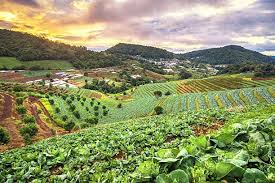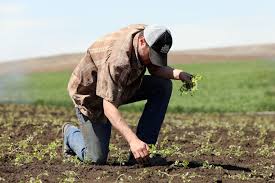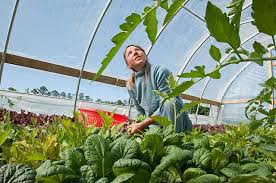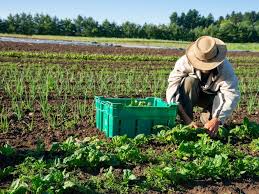Organic farming aims to produce superior quality products, with high nutritional value and no chemicals, with the purpose of good health.
It aims to create a sustainable system that conserves energy, soil, and water, while at the same time providing general maintenance of the environment.
The driving force behind the organic agricultural sector is the lack or absence of (not using) pesticides and herbicides, growth hormones, and antibiotics in the production process.
Read Also: How to Grow, Use and Care for Wildrye Grass (Elymus spp.)
Organic Agriculture as an Alternative to Conventional Farming

Organic agriculture is the counter movement to conventional agriculture that supports a more natural relationship between production and the environment in which production takes place.
The need to support this relationship and to reduce the negative impact of horticulture and agriculture on the environment necessitates that all organic production methods around the world should be based on four main principles: Health, Fairness, Ecological Balance, and Care.
These principles provide a vision for agriculture that inspires environmentally friendly cultivation and production and also influence the practices of organic producers.
Establishment of Organic Agriculture Principles
The Principles of Organic Agriculture were established by the International Federation of Organic Agriculture Movements (IFOAM).
The General Assembly of IFOAM approved the Principles of Organic Agriculture on September 28, 2005. The principles were developed during an intensive two-year participatory process.
These principles are the roots from which organic agriculture grows and develops. They express the contribution that organic agriculture can make to the world and a vision to improve all agriculture in a global context.
Composed as inter-connected ethical principles to inspire the organic movement in its full diversity, they guide development of positions, programs, and standards.
The aim of the principles is both to inspire the organic movement and to describe the purpose of organic agriculture to the wider world.
Understanding the Application of Organic Agriculture Principles

The guiding principles of organic agriculture encompass the fundamental motivation, practice, goals, and caveats that are considered important for producing high-quality food, fiber, and other goods in an environmentally sustainable way.
The principles apply to agriculture in the broadest sense, including the way people tend soils, water, plants, and animals in order to produce, prepare, and distribute food and other goods.
They concern the way people interact with living landscapes, relate to one another, and shape the legacy of future generations. They are the roots from which organic agriculture grows and develops.
They express the contribution that organic agriculture can make to the world and a vision to improve all agriculture in a global context. The Principles of Organic Agriculture serve to inspire the organic movement in its full diversity.
The Four Core Principles of Organic Agriculture
1. Principle of Health in Organic Agriculture
This principle states that:
“Organic agriculture should sustain and enhance the health of soil, plant, animal, human, and planet as one and indivisible.”
The principle of health in organic agriculture refers to the health of ecosystems, as well as the health of people and communities. Healthy soil produces healthy crops, and in turn, healthy produce leads to healthy animals and humans.
Health is the wholeness and integrity of living systems. It is not simply the absence of illness, but the maintenance of physical, mental, social, and ecological well-being. Immunity, resilience, and regeneration are key characteristics of health.
The role of organic agriculture, whether in farming, processing, distribution, or consumption, is to sustain and enhance the health of ecosystems and organisms from the smallest in the soil to human beings.
In particular, organic agriculture is intended to produce high-quality, nutritious food that contributes to preventive health care and well-being. In view of this, it should avoid the use of fertilizers, pesticides, animal drugs, and food additives that may have adverse health effects.
Organic agriculture aims to provide healthy food that is nutritious and superior in quality. In addition, it must contribute to the health and well-being of soil, plants, animals, humans, and the earth.
It is the sustenance of mental, physical, ecological, and social well-being. For instance, it provides pollution and chemical-free, nutritious food items for humans.
2. Principle of Ecology in Organic Agriculture
This principle states that:
Organic Agriculture should be based on living ecological systems and cycles, work with them, emulate them, and help sustain them.
This principle roots organic agriculture within living ecological systems. It implies that production is to be based on ecological processes and recycling.
Nourishment and well-being are achieved through the ecology of the specific production environment. For example, in the case of crops, this is the living soil; for animals, it is the farm ecosystem; for fish and marine organisms, the aquatic environment.
Organic farming, pastoral, and wild harvest systems should fit the cycles and ecological balances in nature.
The principle dictates that organic farms are to be based on an ecological system that balances with the environment and nature, including recycling and taking care of the ecosystem.
For animals, care should be taken of the farm itself. For crops, attention should be given to the living soil.
Ecological balance includes managing conditions and culture; and farmers, producers, traders, and consumers should take environmental protection on board.
Air, water, biodiversity, climate, and land need to be protected and can be done through the use of high-tech farming systems.
These cycles are universal, but their operation is site-specific. Organic management must be adapted to local conditions, ecology, culture, and scale.
Inputs should be reduced by reuse, recycling, and efficient management of materials and energy in order to maintain and improve environmental quality and conserve resources.
Organic agriculture should attain ecological balance through the design of farming systems, establishment of habitats, and maintenance of genetic and agricultural diversity.
Those who produce, process, trade, or consume organic products should protect and benefit the common environment including landscapes, climate, habitats, biodiversity, air, and water.
3. Principle of Fairness in Organic Agriculture
This principle states that:
Organic Agriculture should build on relationships that ensure fairness with regard to the common environment and life opportunities.
Fairness is characterized by equity, respect, justice, and stewardship of the shared world, both among people and in their relations to other living beings.
This principle emphasizes that those involved in organic agriculture should conduct human relationships in a manner that ensures fairness at all levels and to all parties farmers, workers, processors, distributors, traders, and consumers.
Organic agriculture should provide everyone involved with a good quality of life and contribute to food sovereignty and reduction of poverty. It aims to produce a sufficient supply of good quality food and other products.
The principle of fairness refers to good human relationships and quality of life. Organic agriculture is based on providing a fair and just environment for people to live in.
Organic farmers are expected to ensure work completed at their farm is fair to all involved, from the farmers and pickers through to the distributors and consumers.
It aims to provide quality food and other products, and animals are to be housed in conditions that are in accordance with their natural behavior and well-being.
Organic agriculture merges human life with animals and plants – and ensures they are all used sensibly now, and into the future.
This principle insists that animals should be provided with the conditions and opportunities of life that accord with their physiology, natural behavior, and well-being.
Natural and environmental resources that are used for production and consumption should be managed in a way that is socially and ecologically just and should be held in trust for future generations.
Fairness requires systems of production, distribution, and trade that are open and equitable and account for real environmental and social costs.
Fairness is evident in maintaining equity and justice of the shared planet both among humans and other living beings.
Organic farming provides good quality of life and helps in reducing poverty. Natural resources must be judiciously used and preserved for future generations.
Read Also: How to Grow, Use and Care for Wilman Lovegrass (Eragrostis superba)
Principle of Care in Organic Agriculture

This principle states that:
Organic Agriculture should be managed in a precautionary and responsible manner to protect the health and well-being of current and future generations and the environment.
Organic agriculture is a living and dynamic system that responds to internal and external demands and conditions.
Practitioners of organic agriculture can enhance efficiency and increase productivity, but this should not be at the risk of jeopardizing health and well-being.
Do you have any questions, suggestions, or contributions? If so, please feel free to use the comment box below to share your thoughts. We also encourage you to kindly share this information with others who might benefit from it. Since we can’t reach everyone at once, we truly appreciate your help in spreading the word. Thank you so much for your support and for sharing!

